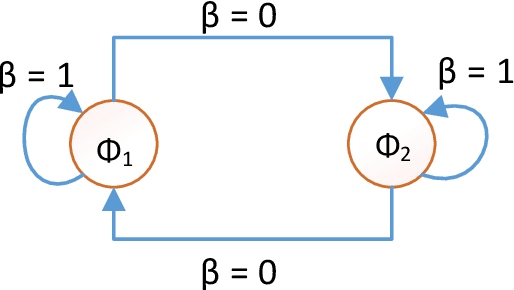Ali Mohammad Saghiri
VDHLA: Variable Depth Hybrid Learning Automaton and Its Application to Defense Against the Selfish Mining Attack in Bitcoin
Feb 15, 2023



Abstract:Learning Automaton (LA) is an adaptive self-organized model that improves its action-selection through interaction with an unknown environment. LA with finite action set can be classified into two main categories: fixed and variable structure. Furthermore, variable action-set learning automaton (VASLA) is one of the main subsets of variable structure learning automaton. In this paper, we propose VDHLA, a novel hybrid learning automaton model, which is a combination of fixed structure and variable action set learning automaton. In the proposed model, variable action set learning automaton can increase, decrease, or leave unchanged the depth of fixed structure learning automaton during the action switching phase. In addition, the depth of the proposed model can change in a symmetric (SVDHLA) or asymmetric (AVDHLA) manner. To the best of our knowledge, it is the first hybrid model that intelligently changes the depth of fixed structure learning automaton. Several computer simulations are conducted to study the performance of the proposed model with respect to the total number of rewards and action switching in stationary and non-stationary environments. The proposed model is compared with FSLA and VSLA. In order to determine the performance of the proposed model in a practical application, the selfish mining attack which threatens the incentive-compatibility of a proof-of-work based blockchain environment is considered. The proposed model is applied to defend against the selfish mining attack in Bitcoin and compared with the tie-breaking mechanism, which is a well-known defense. Simulation results in all environments have shown the superiority of the proposed model.
Nik Defense: An Artificial Intelligence Based Defense Mechanism against Selfish Mining in Bitcoin
Jan 26, 2023



Abstract:The Bitcoin cryptocurrency has received much attention recently. In the network of Bitcoin, transactions are recorded in a ledger. In this network, the process of recording transactions depends on some nodes called miners that execute a protocol known as mining protocol. One of the significant aspects of mining protocol is incentive compatibility. However, literature has shown that Bitcoin mining's protocol is not incentive-compatible. Some nodes with high computational power can obtain more revenue than their fair share by adopting a type of attack called the selfish mining attack. In this paper, we propose an artificial intelligence-based defense against selfish mining attacks by applying the theory of learning automata. The proposed defense mechanism ignores private blocks by assigning weight based on block discovery time and changes current Bitcoin's fork resolving policy by evaluating branches' height difference in a self-adaptive manner utilizing learning automata. To the best of our knowledge, the proposed protocol is the literature's first learning-based defense mechanism. Simulation results have shown the superiority of the proposed mechanism against tie-breaking mechanism, which is a well-known defense. The simulation results have shown that the suggested defense mechanism increases the profit threshold up to 40\% and decreases the revenue of selfish attackers.
 Add to Chrome
Add to Chrome Add to Firefox
Add to Firefox Add to Edge
Add to Edge